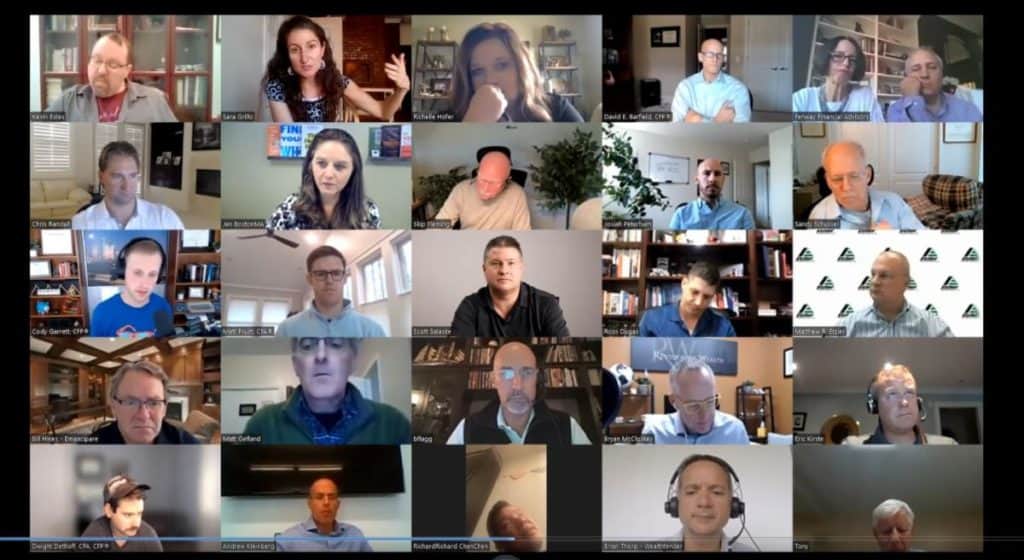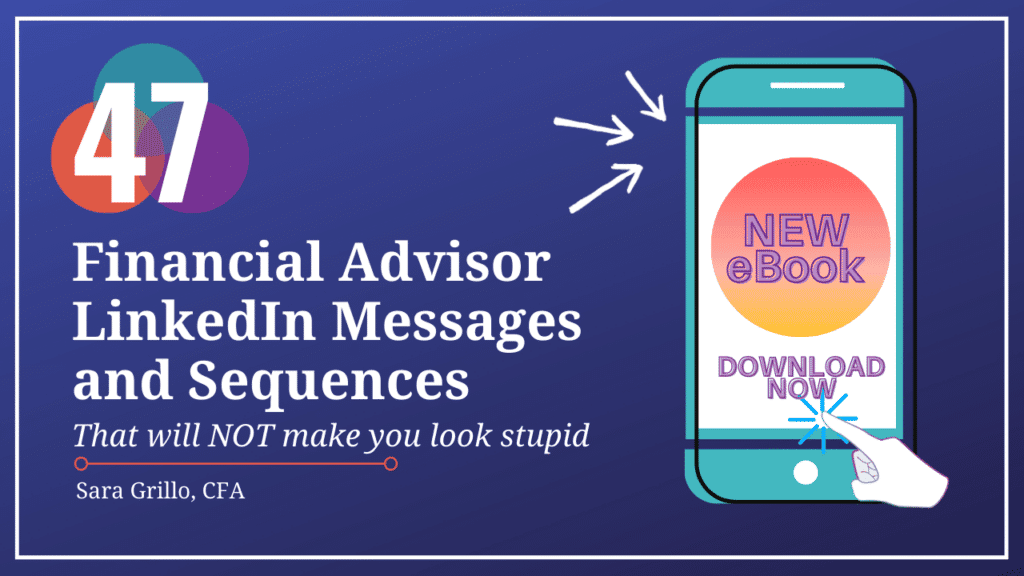Podcast: Play in new window | Download
So where’s the spot bitcoin ETF and what’s up with these crypto ETFs in general? Will the SPY lose its crown this year? Are semi-transparent ETFs are raw deal? This episode we’re going to be talking about 2023 ETF trends and I thrilled to have some of industry’s most knowledgeable people here to rap about it all: Nate Geraci, host of ETF Prime podcast and President of the ETF Store, and Phil Bak, founder of Armada ETFs.
I wanted to have this talk because a lot of advisors just look at ETFs as well, kinda just there. There’s a lot under the surface though and that is what we are going to talk about today so let’s get onto the show!
We’ll discuss:
- Will the SPY become dethroned?
- What exactly is a spot bitcoin ETF and how is it different from a futures bitcoin ETF?
- Do ESG funds suck? (YES!!!)
- What’s up with these semi-transparent ETFs?
- Small ETFs – worth it or too much of a risk?
For those of you who are new to my blog, my name is Sara. I am a CFA® charterholder and financial advisor marketing consultant. I have a newsletter in which I talk about financial advisor lead generation topics which is best described as “fun and irreverent.”

Are we in a market regime shift?
ETFS can be thought of as a wrapper around an investment strategy. There are so many that when you talk about ETFs you are really talking about what is happening with the economy on a macro level. But in 2022, stocks and bonds went down together and displayed high correlation, suggesting a failure of modern portfolio theory.
In 2023, we are coming out of a market regime we have been in since the recession. You could put your money in to US equities, large cap market cap weighted, and that is where the bulk of market flows have gone. Investors may have to think harder about how they are allocated. Alternative asset classes, physical gold, different realms of fixed income, ETFs that use options strategies for downside protection, and other innovative ETFs may become more popular.
It may be time to rethink fundamental portfolio construction…
Semi-transparent ETFs
Geraci is not bullish at all on semi-transparent ETFs. He feels the daily, full transparency of the ETF wrapper is a huge benefit to investors. Active managers though are worried about having their “secret sauce” made public. Geraci feels those concerns are overstated. Active managers have been evidenced to generate outperformance in an ETF wrapper. There is absolutely the opportunity for front running and slippage but Geraci doesn’t think it matters.
Bak says that before Cathie Wood, there was the belief that you couldn’t really succeed as an active manager using ETFs because of front running; but she disproved all of that.
Quick take: what is a bid-ask spread for an ETF?
The way an ETF trades, there is a value based intrinsically on the underlying assets. If we believe it is worth $25, there may be a bid (amount the buyer is willing to pay) of $24.98, and an offer(ask price) of $25.03 from the seller. There is a spread that is the hedging cost of the market maker. Investors can play the spread any number of ways, but that is basically what keeps the ETF in line with its value.
Transparency for the industry has been a good thing because it has kept ETFs trading in line.
Low-cost ETFs steal the show!
SPY turned 30 this year. It may be overtaken by IVV which trails it by about $70BB in AUM. If you look at flows over the last few years, money is coming out of SPY and into VOO and IVV and Geraci believes it is due to the expense ratios being lower.
SPY, at the time of recording this podcast, was at $369 billion. VOO is at $271, VTI is at $274, and IVV is at $300. Bak believes that if the market is down and there is an opportunity to tax loss harvest, there may be an exodus from SPY.
But if there is a Fed pivot leading to market rally, Bak says, the greatest beneficiary will be small caps. SPY’s crown may be taken by VTI in that case.
Will 2023 be the year for physical gold ETFs?
Geraci is puzzled by the fact that in 2022, every single asset class other than commodities went down, and gold was only down by 2% yet there were not major inflows. There were a laundry list of crypto scams in 2022. Bitcoin was referred to as “digital gold”. Geraci posits that some investors may go for actual gold instead of digital gold in search of an uncorrelated asset if a weaker dollar and inflationary concerns persist.
Iran and Russia are working together to create a Stablecoin backed by physical gold. According to Bak, assets don’t care about the ethics of their investors. If they are going to be transacting oil on a gold-backed derivative, that may have an impact.
The spot Bitcoin ETF – come out, come out wherever you are!
Multiple issuers have attempted to bring a spot bitcoin ETF to market, and the SEC has shot them down. In October of 2021, ProShares was successful in bringing the first futures-based ETFs to market. These ETFs have tracked the spot price of bitcoin pretty well.
The SEC won’t allow a spot bitcoin ETF to come to market, but it has allowed bitcoin future ETFS to. The problem is that if you look at where the CME-traded bitcoin futures get their references prices from, they get it from the exact same exchanges that a spot bitcoin ETF would.
They are taking pricing cues from the same place!
The SEC is scared of fraud and manipulation from these exchanges, but it doesn’t seem to make sense which is why Grayscale sued them.
But as of today, a spot bitcoin ETF doesn’t exist, and for this reason people have resorted to other sources to get bitcoin exposure, such as the Grayscale Bitcoin Trust, a private trust that trades over the counter. This traded at one point at a premium and now trades at a large discount. It has not done a good job of tracking the spot price of bitcoin. Or they invest in bitcoin on their own using self-storage (at the risk of losing their keys).
It looks like the SEC wants full oversight of the crypto exchanges and until that happens it’s unlikely we’ll see a spot bitcoin ETF.
Quick take: how does a bitcoin futures contract work?
A bitcoin futures contract gives you the right to purchase bitcoin at some point in the future at a certain price. You may buy it in January with the right to purchase bitcoin at the price that prevails for the asset in February or March, for example. When you hold a bitcoin futures, you are essentially speculating on what the price of the asset will be at that point in time.
As the futures get closer to the maturity date, the futures price essentially converges to what the spot price is at that time.
Quick take: How do you roll a bitcoin futures contract?
Bitcoin futures ETFs will roll the futures contracts month to month. When the futures curve is in contango, in which the far away months are higher than the near months, you have what is called a negative roll.
You are essentially selling low and buying high (remember you are buying bitcoin at the spot price that persist when the contract matures). This can be a huge headwind for returns in a bitcoin futures ETF.
The point is that long term a bitcoin futures ETF is probably going to trail the spot price of bitcoin, which is what Geraci says he’s seen with other futures-based ETFs.
Morgan Stanley disappointingly issuing ETFs
Morgan Stanley has started rolling out their own ETFs and the first wave is ESG funds. The worst part is that their wealth management clients’ portfolios will be stuffed with this crap. The core ETFs will likely follow this initial crap-based offering.
ESG sucks for the following reasons:
- The ratings agencies don’t even agree on whether or not a stock is an ESG stock or not.
- ESG is not a primary market transaction which would have influence over a company. It is a second market transaction which is conducted between shareholders and has little if any impact. The shares are already issued and the company doesn’t care unless the stock price goes so low that it gets delisted.
- If a good company goes down the hedge funds who don’t care about ESG will buy it back up.
- It puts the investment manager in charge as the arbiter of morality for virtue points, which is hard to do at a top-down level as opposed to an issue-specific level.
- The markets are a natural ESG screener anyways. If you have an issue with something a publicly traded company does, stop using their products and then their earnings will go down.
- Investment managers are smart and pay attention to ESG risks such as litigation. They just don’t call them ESG risks.
Is the bias against smaller ETF issuers flawed?
The liquidity of a small ETF is fine as long as the underlying liquidity of whatever it holds is fine. Many people have a $100MM threshold when it comes to investing in ETFs.
The idea that we can only invest in large funds by the largest issuers is suppressing innovation. It also creates a systemic risk because everyone is in the same funds or another. There is always more liquidity on the way in than the way out.
People say that ETFs are the Silicon Valley of asset management. There are no better entrepreneurs in the industry. The problem is that if a smaller ETF has some success, the larger issuers will come in and offer it at a lower price due to the scale that they have.
Sara’s upshot on crypto ETFs and other trends
What’d ya think of my show on crypto ETFs and other 2023 trends? Was this helpful?
If yes…
Join the Transparency Advisor Movement.

The Transparent Advisor Movement’s mission is to promote ideals of clarity, modesty, integrity, dignity, and client advocacy in all aspects of financial advice, with a special focus on Advice Only, Flat Fee, and Hourly service models. There is a special emphasis on clear disclosure of services and their related fees.
The Transparency Movement is the future of the industry – we welcome anyone who believes in our values to join us.
Join our next Transparent Advisor virtual meetup.

These meetups are free and the goal is to learn from each other about how to grow and manage a transparent practice for the benefit of clients.
Even if you can not make the meetup, or even attend in its entirety, please register for the replay and to be notified of the next one.
For marketing tips in the transparency age…
Learn what to say to prospects on social media messenger apps without sounding like a washing machine salesperson. This e-book contains 47 financial advisor LinkedIn messages, sequences, and scripts, and they are all two sentences or less.

You could also consider my financial advisor social media membership which teaches financial advisors how to get new clients and leads from LinkedIn.

Thanks for reading. I hope you’ll at least join my weekly newsletter about financial advisor lead generation.
See you in the next one!
-Sara G
Biographies
About Phil Bak
Phil is the Founder/CEO of atNav, an early stage capital markets technology company. Phil has previously served as the Founder/CEO of Exponential ETFs (acquired by Toroso Investments), Chief Investment Officer of Signal Advisors, and Managing Director at NYSE.
Phil is the author of two patents on innovative ETF structures, has led market structure enhancements that have become industry standard, and pioneered new investment strategies into the market. Phil has been featured in top-tier media outlets such as the Wall Street Journal, Bloomberg, CNBC, Financial Times and Reuters.
Phil holds the Chartered Alternative Investment Analyst (CAIA) designation and is the host of The ETF Experience and the Phil Bak Podcast. Read him on Substack at: https://philbak.substack.com/
About Nate Geraci
Nate helped launch The ETF Store, Inc., nationally recognized as the first investment advisor to offer only Exchange Traded Funds. He is also creator and host of the weekly podcast “ETF Prime”, which Bloomberg has called one of the “most helpful plain-English resources for investors who want to demystify exchange-traded funds”. Nate is Co-Founder of The ETF Institute, the first and only independent organization providing ETF industry professionals and financial advisors with certification, education, and training pertaining to ETFs.
Nate is regularly quoted in various national publications including Bloomberg, Business Insider, The Wall Street Journal, Financial Times, and CNBC, has appeared on Bloomberg Radio & TV, and was named one of Ingram’s 2013 “40 Under Forty” in Kansas City. Nate also serves as a board member for the Kansas Council for Economic Education.
He earned both his undergraduate degree in Business Administration and his MBA from the University of Kansas. He holds Series 7 and 65 Securities Licenses in addition to a Life & Health Insurance License.
Disclosures
Grillo Investment Management, LLC does not guarantee any specific level of performance, the success of any strategy that Grillo Investment Management, LLC may use or mention in any of its content, or the success of any program it may mention in any of its content. Grillo Investment Management, LLC will strive to maintain current information however it may become out of date. Grillo Investment Management, LLC is under no obligation to advise users of subsequent changes to statements or information contained herein. This information is general in nature; for specific advice applicable to your current situation please contact a consultant or advisor. I want to be clear that nothing in this podcast or blog can be interpreted as an investment recommendation of any type. The opinions expressed herein do not necessarily represent the views of Sara Grillo or Grillo Investment Management, LLC. Also, nothing in this podcast or blog can be interpreted as legal or compliance advice. For advise on such matters, contact a legal or compliance advisor. Any similarities to persons deceased or alive are entirely coincidental.
Sara Grillo owns shares of Tesla, (ticker: TSLA) and iShares Core S&P 500 ETF (ticker: IVV) , in her personal account at the time of this blog being published.







